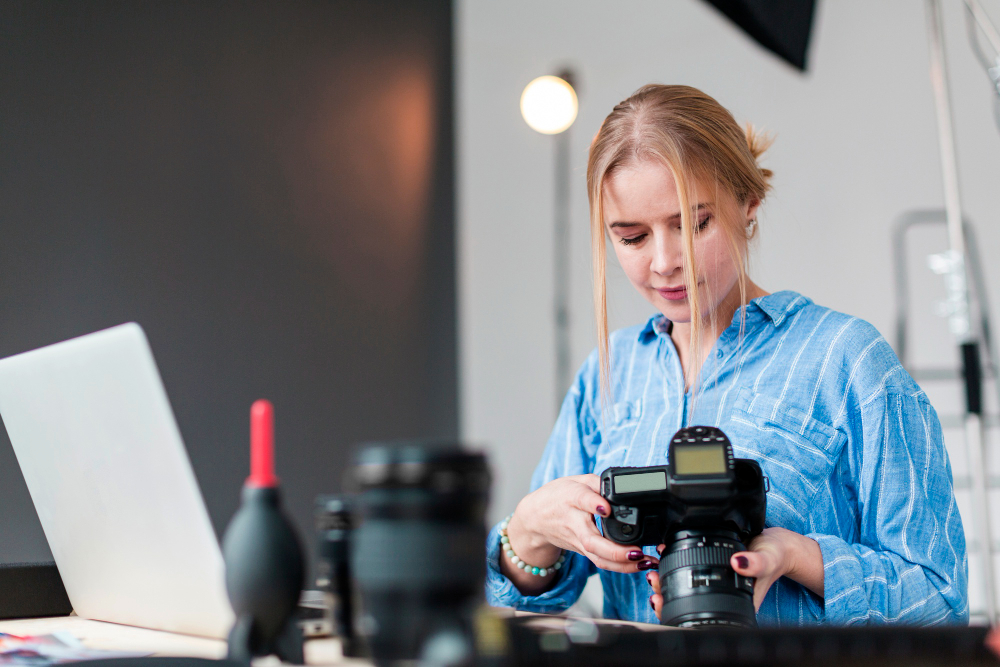Key takeaways
- Digital photography has become a professional field thanks to the advancements in digital technologies.
- With a digital photography degree, students develop a wide range of technical skills, concepts, and knowledge of industry best practices.
- Technical skills include include ISO sensitivity, shutter speed, aperture, autofocus, and the ability to shoot in RAW and JPEG formats.
- Digital photography offers ease with features like instant playback and editing but also presents challenges such as equipment cost and advanced techniques.
- Many accredited institutions offer online photography degrees. This ensures flexibility and access to a broader range of students with different needs.
- A photography degree enhances technical skills, provides access to professional resources, and improves your career opportunities.
- Photography degrees often include courses in lighting techniques, color theory, commercial photography, and specializations such as fashion or photojournalism.
- Lastly, some of the best colleges for photography include the University of New Mexico, Southern New Hampshire University, and Maryland Institute College of Art (MICA).
Digital photography was treated as just a hobby that you would indulge in on the side. Only recently, it has gained popularity, and people have started considering it a serious career path. This change happened due to the increasing use of visual means to convey messages and do so much more, thanks to the digitalization of everything, from marketing to human interactions.
Today, digital photography is a popular college major chosen by many young aspiring photographers. Most impressively, this degree is not just for newbies. Many digital photographers who have their careers up and running are also now seeking to get formal education to fulfill their skills and get better photography jobs.
However, during your college planning, even if you know what major you want to do, there will be some important questions in your head. Therefore, you must dig deep and find answers to all your frequently asked questions. So, to help you start your exploration, here are all the commonly asked questions answered with sufficient details.
List of frequently asked questions about digital photography

So, here are all the questions with their answers!
What is digital photography?
Any process that uses electronic devices or digital equipment is relabelled as being “digital”. When it comes to photography, the definition is no different.
Photography has evolved drastically over the past few decades. Compared to the tedious and cumbersome process of creating images with light and manual equipment, digital photography is much simpler and faster. Today, digital photography uses digital cameras with sensors and digital signals that create images in an instant.
However, keep in mind that digital photography is not limited to using just digital cameras like DSLRs and video cameras. Instead, digital photography encompasses any electronic or digital device that captures an image, such as a mobile phone, a tablet, or a drone.
There are many core features of digital photography which include:
- ISO sensitivity: Controls the camera’s sensitivity to light.
- Shutter speed: Controls the duration of light exposure.
- Aperture (f-stop): Adjusts the amount of light entering the lens.
- Autofocus: Assists in focusing on subjects quickly and accurately.
- RAW and JPEG formats: RAW provides more post-processing flexibility; JPEG is compressed and ready to use.
- Continuous shooting: Captures multiple frames in quick succession, useful for action shots.
- Lens variety and compatibility: Different lenses offer varying focal lengths, apertures, and optical qualities.
Is digital photography hard?
Many aspects make digital photography easier than any other type of photography. Yet, there may be some ways that digital photography could be hard. Features like instant playback and preview, instant editing, full control over lighting, and lens variety make digital photography a heaven for photography enthusiasts.
Meanwhile, features like equipment cost and maintenance, editing software, manual controls, advanced image processing, and advanced lighting techniques are a challenge in this field. However, formal education, digital photography courses, and many such programs offer ease and an enriching learning experience.
Briefly, digital photography is advanced and keeps evolving. Therefore, beginners or people who do not keep up with industry trends might find it a challenging profession or hobby. On the other hand, with practice and dedication, digital photography is an enjoyable profession.
Is film photography better than digital?
There is no right or wrong answer to which is better; film photography or digital. However, there are distinct differences between the two that grant each of these unique benefits and competitive edges. To help you decide for yourself which is better, here is a list of important features of digital photography and film photography:
Features of film photography
- Distinct look with natural grain, color tones, and dynamic range
- Different types of film stock
- Hands-on image processing that fulfills photographers
- Tangible and physical film negatives
- Longer preservation and value as time passes
Features of digital photography
- Instant review and unlimited shooting
- More cost-effective and quicker
- Easily adjust exposure, color, and composition with software like Photoshop
- Advanced features like autofocus, image stabilization, and burst shooting
- Digital images can be easily shared online, stored in the cloud, and backed up
- Greater control over the final images
When did digital photography become popular?
Digital cameras became common and commercially available in the 1990s. However, due to limited technological advancements, it was still not as popular as it was in 2004. In the years 2004 and after, film photography equipment was sold significantly less than digital photography cameras and other equipment.
How to get started with digital photography?
To get started with digital photography on your own, you may follow these steps:
- Investing in good photography equipment
- Exploring, learning, and buying editing software
- Learning lighting basics
- Work on freelance projects
- Find an internship
A formal education, such as a bachelor’s degree, might be one of the most impactful steps you take in helping you get started with digital photography if you have not already. If you are already practicing this skill, and doing projects and jobs, then a formal education is also a great choice. This is because a degree, certification, or course will help you become more confident, learn the art from qualified teachers, and apply to higher-paying jobs.
What is a digital photography degree?
Since you already know what digital photography is, understanding what a degree in this field offers will not be difficult. Particularly, a degree in photography is an undergraduate program thoroughly planned out to prepare students to become professional photographers. Typically, photography-related degrees prepare students for various types of specialized photography fields, such as food photography and fashion photography. However, the specializations and coursework can vary from one college to another.
In a photography degree, you can find many important courses that help you learn photography theoretically as well as practically. Some of these courses include:
- Lighting techniques and theories
- Color theory
- Commercial photography
- Digital image manipulation
- Experimental photography
- Photojournalism
- Portfolio development
- Digital camera operation
- Photographic aesthetic concepts
- Photo editing and post-production
In addition to the courses, there are concentration areas that you can choose, which most commonly include:
- Fashion photography
- Product photography
- Film and motion pictures
- Landscape photography
- Wildlife photography
- Photojournalism
At the end of the digital photography degree, you can expect yourself to learn some important skills, which may be technical or transferable skills. Some of these skills include:
- Camera operation
- Lighting techniques
- Post-processing
- Digital workflow
- Art direction
- Set design
- Visual culture
- Marketing and branding
- Client dealing
- Communication and presentation
When was digital photography invented?
The first digital camera was invented in the mid-1970s. However, it became popular only in the 1990s.
Who invented digital photography?
Digital photography was invented by Steven Sasson, an engineer at Eastman Kodak. Additionally, in 1975, he created the first digital camera.
What distinguishes digital photography from traditional photography?
There are core differences between the two, So, here are the detailed differences between digital photography and traditional photography:
| Digital photography | Traditional photography | |
| Image capturing mechanism | Electric and digital sensors. | Photographic film is also known as a “negative”. |
| Image processing | Post-processing on editing software like Adobe Photoshop. Digital files on PC and laptops. | Chemical image processing in darkrooms. Post-production editing on final images is not possible. |
| Image storage | Digital files, cloud storage, memory cards, phone storage, USB flash drives, and hard drives. | Physical negatives, slides, and printed images. |
| Cost | Only initial investment in camera equipment. One camera can produce multiple images without costing extra. | While equipment costs may be low, one photographic film needs hours of intensive processing and labor. Must buy multiple films to create more images. |
| Editing techniques | Digital software for editing photos | Hands-on image processing with little possibility after the final image |
| Aesthetic value | Explore various modes, manual and auto settings, controlled graphics, and enhanced image resolutions. Stores images in various formats like RAW and JPEG. | Grainy texture with natural tones and hues. May be used for creating vintage appeal. Unique compositions, framing, and dimensions for artistic purposes. |
| Popularity and usage today | More popular and mainstream. Convenient and widely used in filmmaking and commercial projects. | Darkroom image processing is mostly practiced by enthusiasts and specialized artists. It is a rare skill now, so it is a very niche industry. |
What is a digital photography class?
First of all, digital photography classes vary based on the context. For example, there are photography classes in undergraduate programs, while you may attend a relevany class during an online course. Depending on which type of class you are taking, the coursework and details of the class vary.
How to find digital photography classes near me?
You can utilize several tools to explore digital photography classes near you. Firstly, search for classes and courses on online search engines like Google and Bing. Secondly, you can find many courses and classes on online platforms like Coursera and Udemy.
Every state has public colleges and community institutes and training centers. Moreover, it’s best to visit these institutes physically and learn about their digital photography classes and programs. Otherwise, you can also check out their websites before visiting in-person.
So, depending on the state you reside in, it is best to seek degree advice catered to your locality. Therefore, look for colleges by state to explore digital photography degrees, courses, and classes.
How long is a photography degree?
Depending on which degree you take, the duration may vary. However, here are the three most popular types of degrees and their durations:
- Associate: 2 years
- Bachelor/Undergraduate: 4 years minimum
- Graduate degree: 1 to 3 years
Should I get a photography degree?
Deciding which college major to choose is definitely an important decision. Therefore, you must assess and evaluate your personal preferences, as well as match the degree requirements with your personality and feasibility. So, here are some reasons and signs that tell you that you should get a photography degree:
- Passionate about learning
- Have an aesthetic eye
- Would like to work creative jobs instead of desk jobs
- Have resources to invest in photography equipment
- You find a bachelor program that aligns with your career goals
What degree does a photography career need?
For a career in photography, you can explore many educational opportunities to amplify your job opportunities and success rate. For instance, you can look into getting an associate degree from a community college in the USA. Or, you can explore the many kidneys of bachelor degrees for photography careers, such as:
- BA/BS in Visual Arts
- BA/BS in Photography
- BA/BS in Studio Arts
- BA/BS in Filmmaking
- BA/BS in Mass Communication/Media Studies
How to get a photography degree?
To get a photography degree, enroll in a reputable college that offers unique advantages. You can search for colleges by state, and by programs, and check out their program offerings. You must have a decent enough high school GPA, along with complete documentation such as a personal statement and recommendation letter. Having SAT or ACT scores is also a plus point.
Why get a photography degree?
Getting a photography degree can offer several benefits. So, many benefits of getting a photographer degree are:
- Development of technical skills
- Professional networking opportunities
- Access to crucial resources like photo labs
- Peer and faculty mentorship
- Better professional opportunities due to credible formal education
- Chance to create projects for digital photography portfolio
Where to get a photography degree?
Interestingly, you can get a photography degree from many different colleges. Explore digital photography colleges in:
Can I get a photography degree online?
There may be several reasons why you would prefer a photography degree online rather than on-campus. Firstly, many people who work full-time jobs enjoy the flexibility offered by online programs. Moreover, if there are not any good digital photography programs in Alaska, you can check out online options without bearing out-of-state costs.
Consequently, online photography degrees are becoming more popular day by day. These degrees are just as great and have the same credibility as in-person degrees. Furthermore, many reputable colleges like Arizona State University offer accredited photography degrees online.
What are the best digital photography schools and colleges?
To start, discover a list of photography schools and colleges with expert opinions and reviews. The best colleges and universities for photography include:
- University of New Mexico
- University of Arizona
- University of Idaho
- University of Hartford
- Purdue University
- University of Houston
- Maryland Institute College of Art | MICA
- Southern New Hampshire University
Where are the top photography schools?
Notably, some of the best colleges for photography are found in Florida. Moreover, it also has great opportunities for a digital photography career. Moreover, you can find many reputable and leading colleges and universities in California for photography education.
Prepare for your formal education in photography!

In conclusion, a digital photography degree is an exciting field with lots of great career prospects for young students. You should definitely explore academic and professional opportunities in this field. However, asking important questions and finding reliable answers is important for making a safe decision about your college education.
With advancements in technology, photography continues to offer both exciting possibilities and challenges. So, by exploring various degree options and institutions, you can find the right program to match your aspirations.
